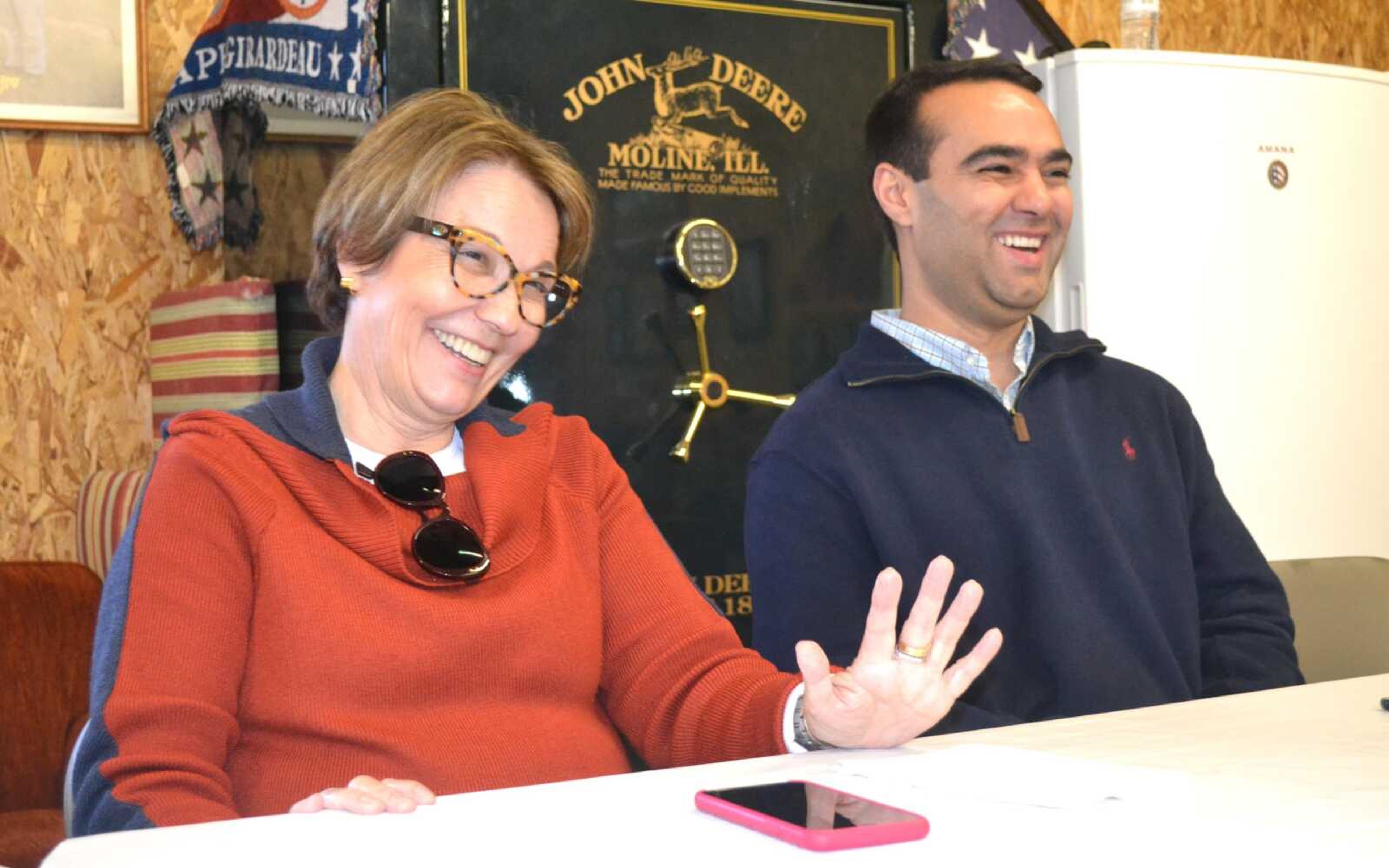Brazil's minister of agriculture meets with local farmers
KELSO, Mo. — Although many farmers in the U.S. see Brazil as a major competitor in the world agriculture market, farmers in both countries appear to have a great deal in common, according to the head of Brazil’s agriculture department. Tereza Cristina Dias was in Kelso on Monday where she met with about a dozen area farmers to discuss agricultural differences and similarities in the U.S. and Brazil...
KELSO, Mo. — Although many farmers in the U.S. see Brazil as a major competitor in the world agriculture market, farmers in both countries appear to have a great deal in common, according to the head of Brazil’s agriculture department.
Tereza Cristina Dias was in Kelso on Monday where she met with about a dozen area farmers to discuss agricultural differences and similarities in the U.S. and Brazil.
Dias, a farmer herself, was the guest of Kenny LeGrand and his brother, Randy LeGrand, third-generation farmers who operate LeGrand Brothers Agri Business, a large row-crop farm near Kelso.
Dias was in the area to visit her daughter and son-in-law, Guilherme and Ana Esteves, and 4-year-old grandson, Edwardo, who live in Cape Girardeau.
For Dias, the family visit gave her an opportunity to have an informal conversation with a group of American farmers to get a sense of their concerns as well as areas of common interest.
“We all want a free market system like anybody else,” said Randy LeGrand. He and others in the room said they view Brazil as both a competitor in terms of world agricultural trade as well as a potential ally from the perspective of opening new markets for both country’s crops.
“It’s good to be here as a farmer to talk with other farmers and exchange experiences,” said Dias, as interpreted by her son-in-law.
Brazil’s agriculture industry has expanded significantly in recent years. Once a major importer of grains, livestock and other agricultural products, Brazil now has approximately 161.5 million acres of farmland and is among the world’s largest exporters of coffee, soybeans, beef and crop-based ethanol. Other major Brazilian crops include sugar cane and cashews.
As a result of the trade tensions between the United States and China, Brazil has stepped in to fill some of China’s need for agricultural products, including soybeans.
“Do you consider China a friend?” one of the farmers asked Dias.
“Sure,” she answered.
Trade disagreements with China have “killed the soybean market,” according to Kenny LeGrand, who gives President Donald Trump credit for “standing up” to China, “Somebody had to do it and bite the bullet.”
According to Dias (whose formal title is minister of agriculture, livestock and supply), one of the biggest challenges facing farmers in Brazil is transportation.
“Brazil is almost as big as the United States, but most of the farms are in the center. We’re far from ports, so logistics is the biggest issue,” Guilherme Esteves quoted his mother-in-law as saying. “We don’t have the river or trains like you have here. Our main form of transportation is trucks and our biggest port is a thousand miles away.”
For crop farmers in Southeast Missouri and Southern Illinois, excessive rain and flood conditions were a significant issue during the 2019 growing season.
“We had flood like we’ve never seen before,” Randy LeGrand told Dias. That’s been a big problem for us and it still is because there’s some land we may never be able to farm again. It’s been very tough on everyone.”
“In Brazil, it has been the opposite,” Dias said through her interpreter. “We have not seen much rain.”
Dias, who became head of the agriculture ministry in January following the election of Brazilian president Jair Bolsonaro in October 2018 and his subsequent inauguration Jan. 1. She has met with various U.S. government officials this year and is scheduled to meet with U.S. Secretary of Agriculture Sonny Perdue in February to discuss areas in which Brazil and the United States can work together to advance agriculture interests in both nations.
“Even though Brazil and the U.S. are competitors in agribusiness, we need to be thinking and acting together to export our products, because the importers are working against us with tariffs and other barriers,” Esteves quoted Dias as saying.
For instance, she said there is an opportunity for both nations to export more ethanol to Europe and China as a gasoline additive. Some gasoline products in the United States contain 10% ethanol made from corn, “but in Brazil, we use 27.5% ethanol and it works,” she said through her son-in-law. “The cars run in Brazil, so there’s a lot of room for ethanol growth.”
Dias’ visit to the LeGrand farm was organized, in part, by George “Skip” Wrape of River City Biologicals in Cape Girardeau.
“Twenty years ago, the farmers here weren’t sure where Brazil was,” he told the farmers who had gathered to meet Dias. “Now, you guys know by 9 o’clock in the morning if its rained there or not.”
Guilherme Esteves was a foreign exchange student from Brazil when he met Wrape 17 years ago. They kept in touch and reconnected in 2009 when Wrape was in Brazil on a business trip. Esteves eventually moved to Cape Girardeau and joined River City Biologicals in 2012. The company has since opened a branch in Brazil, which Esteves oversees. Meanwhile, his wife, Dias’ daughter, is working on her master’s degree in business administration at Southeast Missouri State University.
Do you crave business news? Check out B Magazine, and the B Magazine email newsletter. Check it out at www.semissourian.com/newsletters to find out more.
Connect with the Southeast Missourian Newsroom:
For corrections to this story or other insights for the editor, click here. To submit a letter to the editor, click here. To learn about the Southeast Missourian’s AI Policy, click here.









